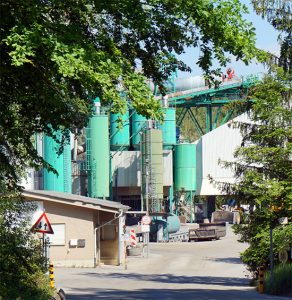
Being a good neighbor is important no matter where you live. It is essential if you are the neighbor that operates an asphalt plant.
Everyone likes nice new smooth roads; few people know how those roads get created, from the raw material mix to the final product the public sees being laid on these roads. Those of us in the industry understand well the amount of material, time, and effort it takes to get the finished product. All the while doing so without disturbing our neighbors around us.
Asphalt plants can emit an odor that not everyone loves to smell. There are actions that can be taken to mitigate the odor from asphalt plants. Additives, commonly referred to as cherry or pine juice, can lessen the smell. These additives are not actually made with cherries or pine, but rather a mix of chemicals that either mask the odor, much like a perfume would, or trap the hydrocarbon and stop release into the air.
Another method for reducing odor is to use misters on the sides of the silos that mist the product as it enters the silo which masks the odor. The mist, a mixture of water and a masking scent, lessens the odor of the asphalt mix but does not eliminate it.
Reducing the temperature at which you mix the product will help to reduce the odor emitted into the air. There are warm mix additives that can be included in the mix which allow for a reduction in temperature. The reduction in temperature reduces the carbon output which diminishes the overall odor.
Noise
Odor is not the only concern that asphalt plants have when considering where to build. Noise is a concern to plant owners/operators and people living in proximity. There are many factors that can create noise, from production equipment to the trucks that move in and out of the plant. Newer plants are much quieter due to technological advancements in equipment. Most, if not all, cities have noise ordinances in place that dictate when and how much noise can emanate from the site.
Older plants have a greater concern with noise as many of them still use open-air burners which are quite loud. Asphalt plants can be retrofitted with newer closed burners to reduce the noise created by older open-air burners. Most newer plants install burners that are encased in a sound suppression drum.
Different types of drive systems are used throughout an asphalt plant. These systems all add to the noise created in the plant. Utilizing variable speed drives (VSDs) will allow operators to determine how much power is needed at a given time. The ability not to turn a motor on at full speed when not required will reduce the amount of noise emitted.
You can imagine the sound created as aggregate moves over the shaker screen onto the conveyor or is rejected and ricochets as it hits the metal drum. Utilizing rubber chutes and screens, as a form of a liner, will aid in noise reduction.
Many other mitigations can be enacted to lower noise throughout the plant. Changing backup alarms on loaders to a lower frequency, which still meets the OSHA standard, is a simple way to help reduce asphalt plant noise, according to Lee Schloss from Kokosing Materials. Adding silencers to air cylinders that operate gates is another simple solution. It’s low cost for a greater reward.
Understanding what is important to your neighbors and potential neighbors in the community in which you plan to build or upgrade your asphalt plant will help you decide how and what you install. Ensuring that you get buy-in from the local community and local government and meet all the permitting requirements will go a long way toward being accepted as a new friendly neighbor.
Arratia is a Business Development Manager at BP Asphalt.













